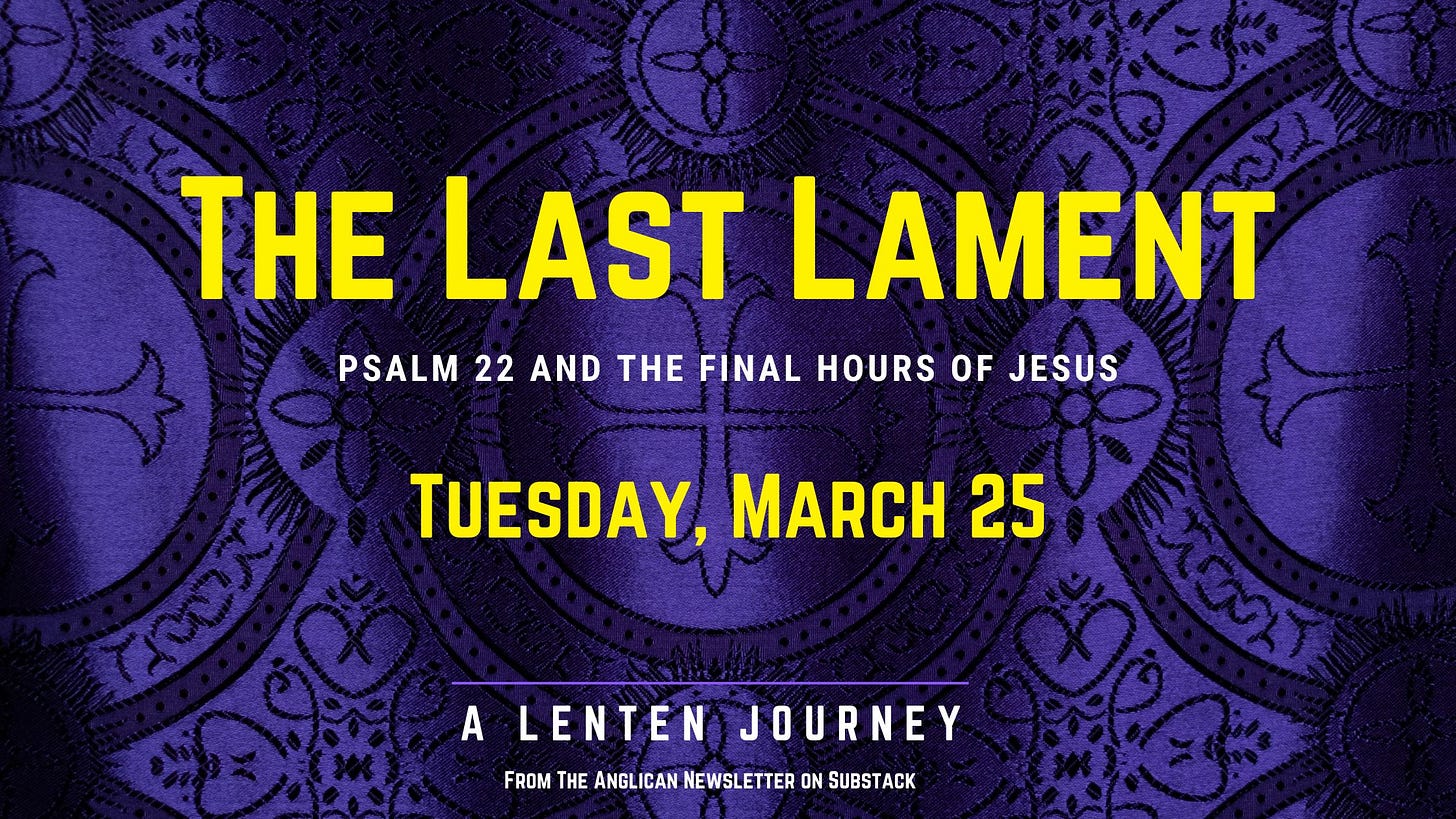The Roaring Lion - Episode XV: The Last Lament
Don't Let the Lies of the Accuser Creep Into Your Mind
Thanks to the generosity of a single donor, every Free Subscriber can upgrade to a paid subscription at 30% off—just over $5/month for an entire year. This is a limited offer. Thanks!
A Note for The Last Lament: We are in a section of the Psalm that vividly describes the horrors awaiting our Lord. As He recites the text of the harrowing ordeal, the events unfold around Him in real time.
The Roaring Lion
As I mentioned yesterday, this week will be difficult. The imagery in the Psalm is focused on wild, ravenous animals—bulls, lions, and wild dogs—each of which presents a significant threat when faced alone in the wilderness. The images of one morph into the other. For example, the strong bulls of Bashan open their mouths like roaring lions.
What was King David experiencing when he imagined this hell? What is Jesus thinking to Himself as he recites these words? Let us move on slowly, understanding the depths of our Savior’s heart.
He says:
“They open wide their mouths at me, like a ravening and roaring lion.”
—Psalm 22:13
A LION’S ROAR can be heard up to five miles away. It is meant to paralyze, to signal dominance, to make prey freeze in place.
Now, in Psalm 22, Jesus describes His enemies with this image—not just threatening, but devouring, hungry, and ravenous. The crowd at the cross, the priests, the mockers—they weren’t just jeering. They were feeding off His suffering, consuming His agony, taking pleasure in His pain.
And behind them all, unseen but real, another lion is imagined. Satan.
Peter would later warn the Church about the Devil.
Be sober. Be watchful.Your adversary, the devil, prowls around like a roaring lion, seeking someone to devour. —1 Peter 5:8
The Devil is loud, for sure. It is terrifying. But for all its roaring, it is not the true King. If you are alert, you will notice that I have not referred to the devil with any human pronouns. That is not an oversight. I am not trying to infer that the devil or evil spirits are impersonal or only a force.
Before we get too far into it, let’s talk about pronouns—the devil’s pronouns.
What are the Devil’s Pronouns?
As often as I must refer to the devil, I try to never use personal pronouns. I explain this in detail in Chapter 8 of my book The First 24.
I will use a literary device—a useful word tool—to refer to unclean spirits and forces of evil. I assign the pronoun "it" to the Devil and all other evil forces for clarity and precision. The Devil, by nature, is sexless and without gender. It does not need to be dignified with a beautiful gender-specific pronoun such as "he" or "she.”
The Devil is not made in the image of God. Nor is it a competing deity to our Lord. This is not treating Satan like a myth. For Jesus, it was very real: there is a dark, quasi-personal, spiritual force waging a fruitless war it has already lost against our God.
Calling it "it" is the very least we can do for it.
Let’s look briefly at Jesus's broader ministry, what He thought about Satan, what he did about the devil and unclean spirits, and, in particular, how Jesus conquered it.
The Strong Man and the Stronger Man
Peter called the devil a roaring lion. That’s powerful. Scary.
However, as powerful as this image is, we must not fear the devil. Its roar is designed to intimidate, for sure. But Jesus called it something else—a bound enemy, all tied up.
Jesus once told a parable about a strong man. If someone wants to plunder a strong man’s house, He said, he must first tie up the strong man. Then, he can take whatever he wants.
"No one can enter a strong man's house and plunder his goods unless he first binds the strong man; then he can plunder his house."—Mark 3:27
The meaning was clear: Satan had ruled this world long enough. But now, Jesus had come. And He was the stronger one. He was stronger than it. By the Cross and His obedience, His death, and subsequent Resurrection, it is as if the “strongman” of the house (the devil) had been bound up, tied down, and neutralized.
It looked as if the roaring lion was winning, but in reality, it was being bound. Jesus was not the prey. He was the victor. He broke the power of evil over the life of a Christian
Keep reading with a 7-day free trial
Subscribe to The Anglican to keep reading this post and get 7 days of free access to the full post archives.





